Fresno residents share hate crime experiences with mayor, state attorney general in roundtable
Tracie Cisneros, a volunteer coordinator for Fresno Rainbow Pride, still remembers very clearly Dec. 10, 2022 at Our Saviour’s Lutheran Church which was hosting an LGBTQ event.
That day she experienced firsthand name-calling, insults, yelling in her face from masked Fresno Proud Boys who called her by her full name as well as recited her travel history.
Cisneros said Fresno police, who were on scene, did nothing. She said her taunters gave “bro hugs” to the officers.
“I don’t quote other people’s stories, this is my own personal experience,” Cisneros said at a Tuesday afternoon roundtable on hate crimes hosted by state Attorney General Rob Bonta.
A place of worship was vandalized because it opened its arms to the LGTBQ community, another person shared.
A family-own restaurant closed its doors because of harassment and threats because it was an Asian-owned establishment.
Those were some examples provided by community leaders and advocates at the 2-hour-plus discussion on state and local efforts to combat hate crimes.
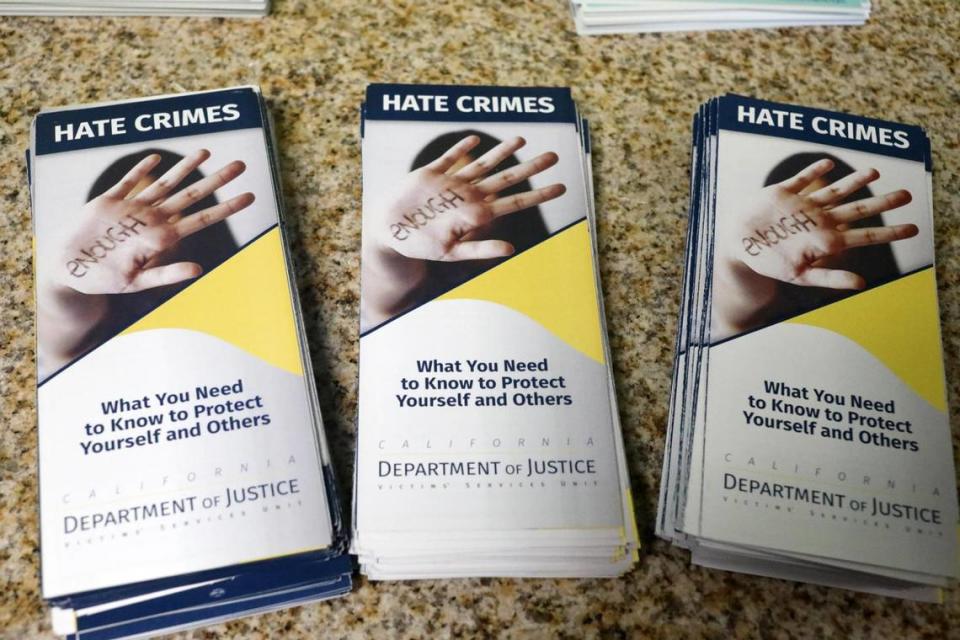
Early this year, Bonta released the 2022 hate crime report that showed a 20.2% increase in reported hate crime events in California, as well as a sharp spike in hate incidents against LGBTQ+ residents, along with Blacks and Jews.
▪ Racially biased events increased by 11%.
▪ Religiously biased events increased by 39%.
▪ And hate crime events involving sexual orientation increased by 29%.
“We can never forget that behind every one of those numbers, every data point there is a person, there is a victim,” Bonta said.
While hate crimes are underreported, education on the front end can help prevent hate incidents from occurring and hate incidents from becoming hate crimes.
A hate incident can be name-calling, insults, a display of hate materials, or distribution of hate materials in public.
Hate incidents — acts that do not rise to the level of a crime — can be harmful and leave lasting, negative impacts on all communities and are not captured in statewide hate crime statistics.
A hate crime is one that targets a person for his or her gender, race/ethnicity, religion, sexual orientation, disability, nationality or association with a person or group with one of these characteristics.
Tuesday’s visit at The Fresno Center was Bonta second visit to Fresno within a two-week period. His previous visit was to announces a new state-local program to tackle illegal commercial cannabis activities.
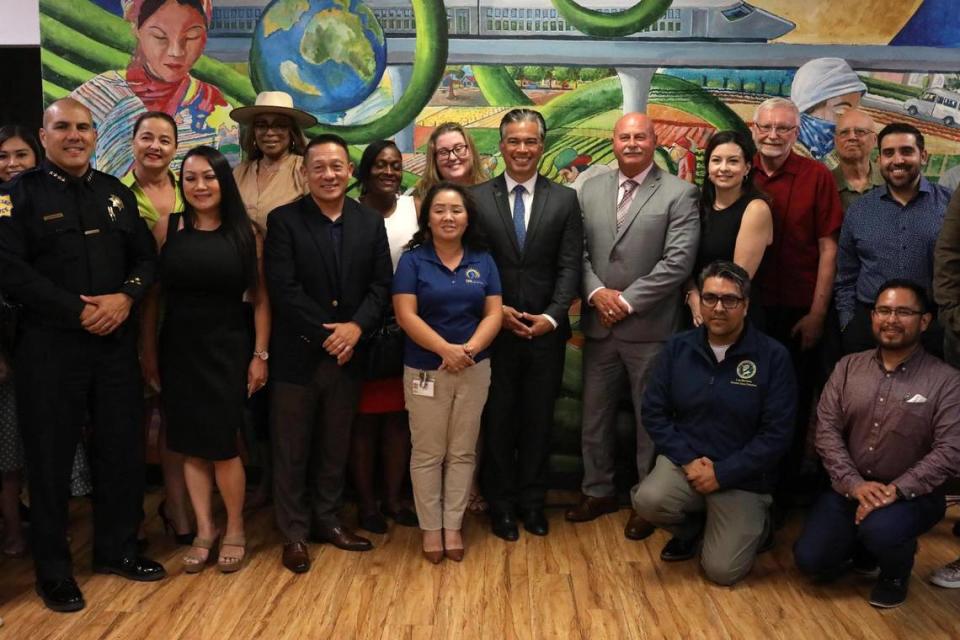
Bonta has hosted hate crime roundtables throughout the state, including San Francisco, Oakland, Sacramento, San Diego, Riverside, Long Beach, Santa Ana, San Jose, Stockton, and Bakersfield.
One takeaway from Tuesday’s event was a commitment to build trust. Bonta said that trust between community and law enforcement is not where leaders want it to be, but that there is a desire from both sides to get there.
The Fresno stop was the 12th in a series of meetings bringing together local elected officials, law enforcement, community leaders and advocates.
This is what was heard Tuesday
Pao Yang, The Fresno Center CEO: “This is such an important topic in our community. A lot of our victims are also here today to share their experience. Those of us that serve our community, we see everything, we deal with everything. And it’s a struggle, and it’s hard. It’s hard. When you have empathy, you have the passion, and you care about your community. And, you don’t want to move, we want to live here, and we want to stay here, we want to be safe. We want to be provided the right resources that are needed in our community.”
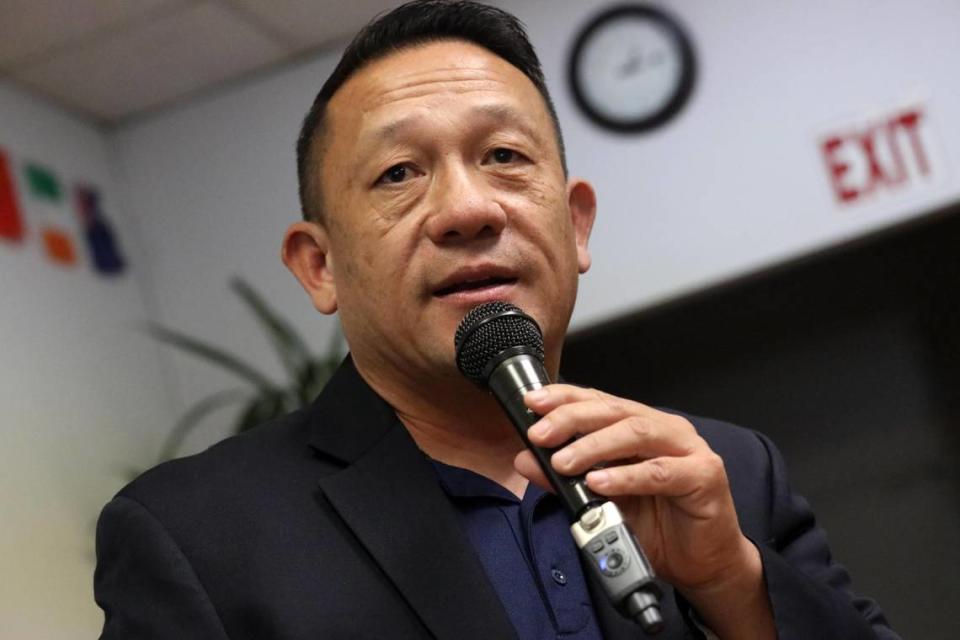
Fresno Mayor Jerry Dyer: “I know how important it is for the law enforcement agencies and city government to be able to respond immediately and take each and every case serious because it only takes one incident, whether it’s a crime or not, whether it rises to the level of a crime or not to create paralysis in a community to create fear in a community and that is not the way any of us should live or need to live within our community.”
Bonta: “In our society, we tend to too often focus on the fewer things that that divide us rather than the many things that bring us together and unite us and we’re seeing that in some of our political rhetoric nationwide and statewide. We’re seeing it at the micro level sometimes and how people treat one another and resorting to violence too quickly and too often. And we can do better. We must do better and we’re seeing it play out in in hate incidents and hate crimes. And they are increasing.”
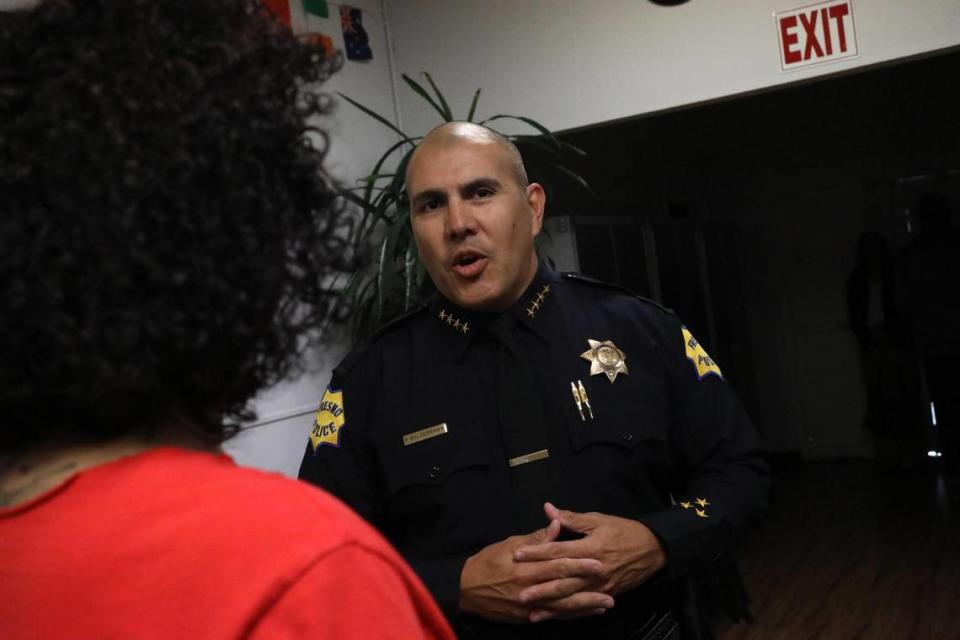
Fresno Police Chief Paco Balderrama: “You know, when you look at the (hate crime) numbers, they’re not super significant, you know, especially here in Fresno County. But part of the reason is because people don’t know that they can report, and people don’t know when they’re being victimized; people have the trust or distrust for police. And when you consider that Fresno is the ninth-most diverse city in America. That’s a big deal. That means we have a lot of communities who are not from here, diverse communities who have different ways of worshipping, loving and being. And it’s important that we educate everybody on what’s out there.”
Naindeep Singh, The Jakara Movement: “Our partnership with the Attorney General’s office and really the way he has supported and really got a champion for the California Department of Social Services Stop the Hate Initiative, where we’ve been able to do especially some intersectional work with LGBTQ Punjabi youth who normally feel extremely ostracized. People are so used to hearing racial and epithets that they’ll actually not report it. So oftentimes when somebody is reporting a crime, they won’t report anything that was actually said or yelled at them.”
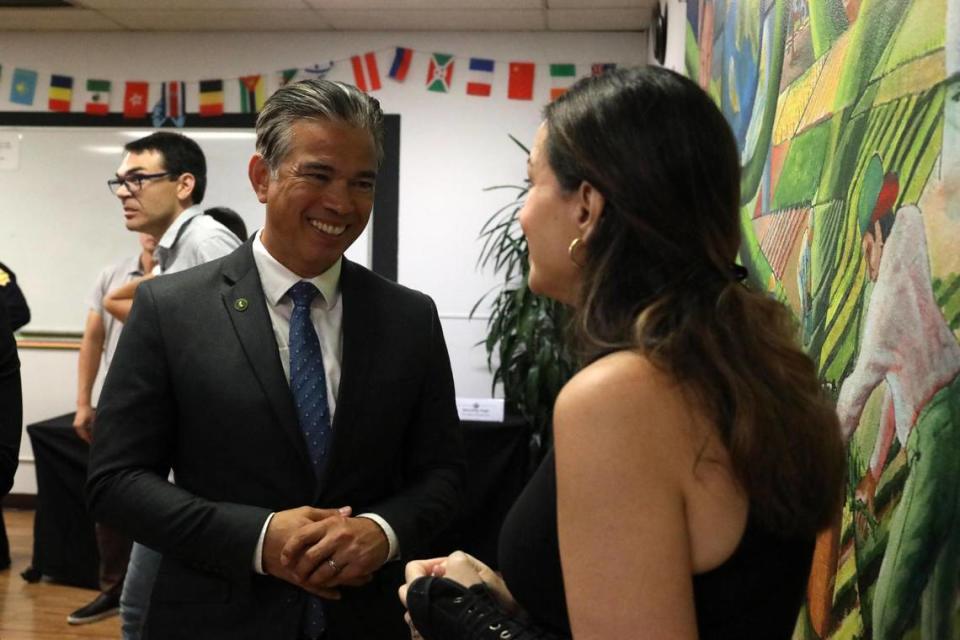
April Taylor-Salery, Trans-E-Motion board member: “We’re having our safe buildings for LGBT people being targeted, now they’re being targeted at school, and with movements to take our history of literature out of libraries.”
Pastor D.J. Criner, Saint Rest Baptist Church: “There is still that fear of retaliation of the 60s and the 50s, the 70s that still exists in the minds of people. And until we disseminate that mistrust and show them a new way of doing it. They’ll always have that fear that’s in the back of their minds. Like a person that is afraid of a spider whenever they see it that in one lane they run right. And so, I don’t want people to be afraid of what our current system is based on what the old system perpetuated.”
Mike Rhodes, ex-editor of Community Alliance newspaper: “I think one of the ways that we stop hate crimes is by modeling the behaviors that we would like to see in the community. I will give you an example. In Reedley we had a very interesting presentation by Indigenous women that talked about murdered and missing Indigenous women, and how they are not taken as seriously as other crimes. And there’s a lot of evidence for that. So equally protecting people who are vulnerable and disenfranchised. If we did that, if we had equal justice, that would give people the sense that they can come to the police or law enforcement and will be taken seriously.”

Dr. Katherine Fobear, university professor and Trans-E-Motion board member: “Last but not least, in order to stop hate crimes, our police need to know about them. And as many of our panelists have said, people have lots of barriers and fears about reporting to the police. This is especially true in our LGBTQ community. Simply put there’s historical trauma there, right, so many LGBT community do not feel safe walking into the police department or approaching a police officer when they are in need. Creating community partnerships with LGBTQ organizations to create spaces where people feel comfortable and supportive talking to the police is essential.”
Edith Rico, Fresno Building Healthy Communities: “There are racist groups and bigots everywhere. Example the Proud Boys. Fresno has seen firsthand of what I would call wolves in sheep’s clothing. Local Proud Boys, which have included some local Fresno police officers or ex-police officers now, spreading hate within our own city. So, while we speak about racism, hate crimes, I would like to ask that a good place to start sometimes would be within our own police departments. Because we know the data shows that performing routine traffic stops based on racial profiling is not policing, it’s racism. Hate crimes are a result of racism and bigotry. As a community organizer and advocate, I would like to know what guidelines and processes we are doing or we’re making and putting in place to avoid from having hate groups or participants from hate groups from operating under the disguise of a law enforcement uniform.”
Socorro Santillán, Planned Parenthood Mar Monte public affairs director: “I’m here representing our patients who are our LGBTQ, our houseless folks, our immigrants, our women. And, you know, definitely we’ve heard throughout the afternoon that there’s distrust, whether it’s with the police department, or with city officials. And you know, what historically has happened, can continue to happen. We need leadership to step it up. We need, when there is a crime, we need you all to call it out what it is not sugar code it. We need you to stand up and let them know that this city won’t have it. Not walk away and pretend that didn’t happen. I asked that you think twice of your actions. We’ve seen how the previous presidential administration impacted the nation overall. And we all knew nationwide what we needed to hear. Well, it also matters here locally. As the mayor, as the chief of police, you influence folks, you set the environment, so we are counting on you for that.”
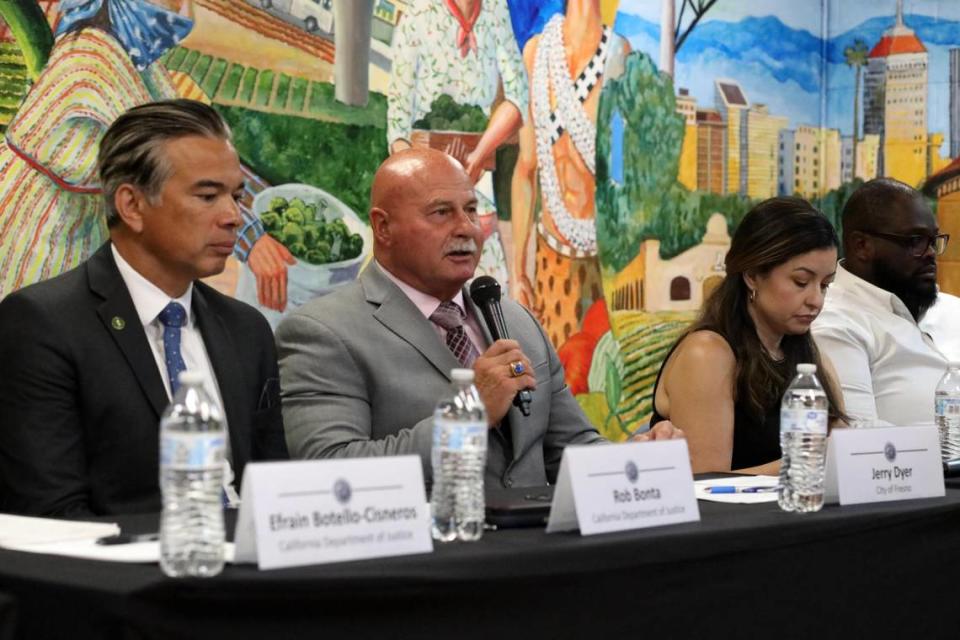
If you believe you or someone you know has been the victim of a hate crime, notify local law enforcement and consider taking the following steps:
▪ If you are in immediate danger, call 911, and if needed, seek medical attention.
▪ Write down the exact words that were used and take note of any other relevant facts.
▪ If safe to do so, save all evidence and take photos.
▪ Get contact information for other victims and witnesses.
▪ Reach out to community organizations in your area that deal with hate crimes or incidents.
Reports of hate incidents can also be made to the California Civil Rights Department CA v. Hate hotline and online portal at any time in 15 languages or by calling (833) 866-4283 or (833) 8-NO-HATE, Monday to Friday from 9 a.m. to 6 p.m., and talking to a trained civil rights agent in over 200 languages.
Outside of those hours, people can leave a voicemail or call 211 to report a hate incident and seek support from a professional trained in culturally competent communication and trauma-informed practices.
More information and guidance from the California Department of Justice is available here: https://oag.ca.gov/news/press-releases/attorney-general-bonta-releases-2022-hate-crime-report-highlights-continued
This is part of a series on Stop The Hate, a project funded by the California State Library.
Task force to tackle growing problem of hate crime in the greater Fresno area
California sees ‘alarming increases’ in hate crimes. San Joaquín Valley isn’t immune
When racism shows as microaggressions. These young Latinas share their experience
Indigenous have faced a culture of racism and discrimination that goes back centuries

